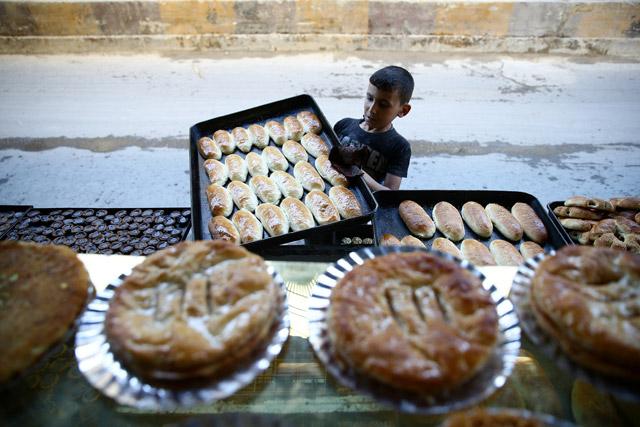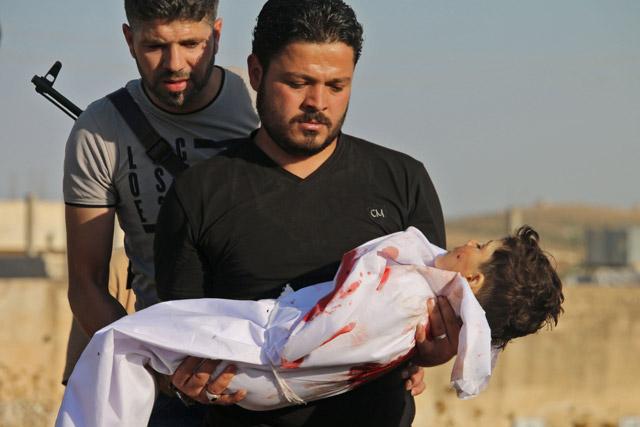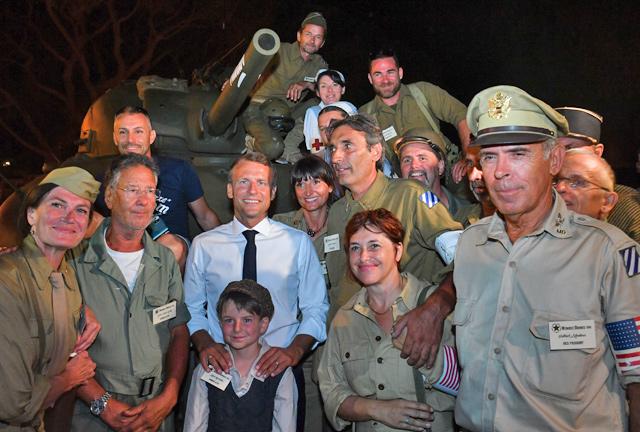You are here
Macron vows reprisals if chemical weapons used in Syria
By AFP - May 29,2017 - Last updated at May 29,2017

A boy arranges pastries to be sold during Ramadan in the rebel-held besieged eastern Damascus suburb of Ghouta, Syria, on Sunday (Reuters photo by Bassam Khabieh)
VERSAILLES, France — France would respond immediately to any use of chemical weapons in Syria, French President Emmanuel Macron said Monday while urging a stepped-up "partnership" with Moscow in fighting the Daesh terror group in the country.
"A very clear red line exists on our side, the use of chemical weapons by whomever," Macron said at a joint news conference in Versailles with his Russian counterpart Vladimir Putin.
"Our absolute priority is the fight against terrorism and the eradication of terrorist groups and Daesh in particular," he said.
"It's the guiding principle of our action in Syria and in which I want... for us to be able to strengthen our partnership with Russia."
The newly elected French leader said he favoured "a democratic transition" in Syria that would "preserve the Syrian state".
He added that “failed states in the region are a threat to our democracies, and we have seen each time they have enabled terrorist groups to advance”.
He regretted that none of the G-7 states are party to Syria peace talks under way in the Kazakh capital Astana initiated by Russia, Iran and Turkey.
Separate UN-backed negotiations have become bogged down in Geneva.
Russia is a strong supporter of Syrian President Bashar Al Assad whereas, as Putin adviser Yuri Ushakov said before the visit, France “is among the countries with a very severe stance towards [Assad’s] regime”.
Putin’s visit is the latest test of Macron’s diplomatic mettle after the G-7 talks in Sicily last week and the NATO summit in Brussels where he turned the tables on Trump by refusing to release the American leader’s hand for several seconds during the handshake for the cameras.
“It is essential to talk to Russia because there are many international issues that will not be resolved without a tough exchange with the Russians,” Macron said in Sicily.
Russia’s powerful ambassador to France, Alexander Orlov, said he hoped the meeting could help turn the page on the fraught relationship between Putin and Macron’s predecessor Francois Hollande.
“Many things in the future will depend on the first meeting,” Orlov told Europe 1 radio.
“It is very important that we begin to dissipate the mistrust that has built up in recent years.”
As a candidate, Macron had tough words for Russia, accusing it of following a “hybrid strategy combining military intimidation and an information war”.
Since the start of the war in Ukraine in 2014, Russia has flexed its muscles with a series of war games involving tens of thousands of troops in areas bordering NATO Baltic states.
Macron told a French weekly that he was “not bothered” by leaders who “think in terms of power ratios”, citing Putin as an example along with Trump.
But Macron, who became France’s youngest president just three weeks ago, said he does not believe in “the diplomacy of public invective but in bilateral dialogue”.
‘Not a single concession’
Macron said he would make “not a single concession” to Russia on the long-running conflict in Ukraine as he and his G-7 counterparts said they were prepared to strengthen sanctions against Moscow.
Government forces have been battling Moscow-backed insurgents in eastern Ukraine for over three years.
Western powers charge Russia with failing to honour its commitments under the Minsk accords framework for ending the hostilities.
France helped spearhead the sanctions, which have seriously dented EU-Russia trade, with a retaliatory Russian embargo on European agricultural products hurting French farmers.
Coming so soon after an election in which the Kremlin was widely seen as backing Macron’s far-right rival Marine Le Pen — with Putin hosting her during a surprise visit to Moscow — the encounter in Versailles will have an added personal edge.
Moscow has also been blamed for a raft of cyber attacks on Macron’s election campaign, with aides accusing the Kremlin of mounting a “smear campaign” against him.
Putin was quick to congratulate Macron on his election, urging him to “overcome mutual distrust” and “join forces to ensure international stability and security”.
The visit comes seven months after Putin cancelled a trip to Paris for the opening of a Russian cathedral complex near the Eiffel Tower in a spat over Syria with Hollande, who had said Russia’s bombing of Aleppo could amount to war crimes.
In Versailles, Macron and Putin will inaugurate an exhibition marking 300 years of Franco-Russian ties since the visit of Russia’s modernising tsar Peter the Great to France in 1717.
After the talks and a joint news conference, Putin will visit the Paris Orthodox cathedral complex on his own.
Related Articles
PARIS — Russian President Vladimir Putin, in an interview published on Tuesday, said he was “convinced” the Syrian government was not behind
PARIS — French President Emmanuel Macron will attempt to convince Russia to accept Ukraine’s overtures of dialogue when he meets Vladim
PARIS — The alleged poisoning of Russian opposition figure Alexei Navalny with the Novichok nerve agent has dealt a blow to French President














